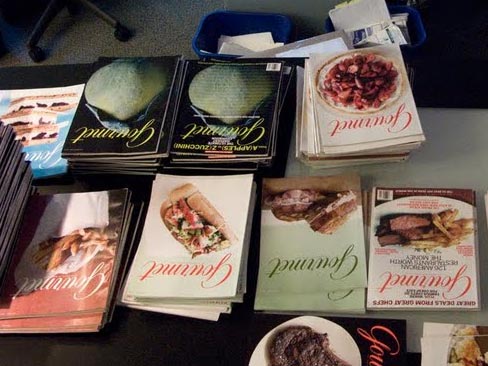The news that Conde Nast is to close its specialist food magazine Gourmet is now official, after months of speculation that the title might be cut as part of the publishing house’s streamlining.
As a freelance journalist trying to carve a niche out for myself in food writing, the news has been (if you’ll pardon my pun) rather hard to swallow.
Of course I know that media, the way we consume media, and the way the media is funded is changing – and the internet revolution, the foodie blogosphere and twitter explosion are fast-usurping more traditional channels like print – but it still makes me sad.
I’m not alone, if the response on Twitter is anything to go by.
What hope is there for aspiring food journalists to ever make a living (or even a bit of their living) writing about our specialist subject if even the most famous of quality food publications, which has been going for 70 years is going to close?
We all know that steep drops in traditional forms of advertising forced the mag (like every other anorexic print publication around) to cut pages because of the shift from advertising to targeted online marketing, but what about the readers and writers?
We still exist – and now we’re left with a hole to fill. While I’m a fan of the online food content boom (I have a food blog myself) and I love its speed, relevance and interactivity, I still strongly believe that online content can’t fully replace magazines like Gourmet.
It was, as Jay Rayner says in his Guardian post about its closure: ‘The glossiest, the shiniest, the most indulgent’.
The end of Gourmet is indicative of the general move toward free online content rather than investment in quality writing, and high spec, niche publications. Tim Hayward, Guardian columnist and food writer agrees, describing the move of the publishing house as ‘baffling’.
“Does it really mean that intelligent special interest reading isn’t valuable? If they can’t tap into market with a serious disposable income then what hope is there?” he asks.
Hayward, who is starting a printed food publication, http://www.fireandknives.com/, for exactly the readers and writers abandoned by Gourmet’s closure, highlights the gap in the market left by its passing. “It’s about the medium as much as the writing, about having the object there in front of you. Sitting down at the coffee table with it was slightly like pornography and you can’t claim that that can be replaced by online for that audience.
“The reason I’m starting Fire and Knives is because no one was talking to that group over here. Now that’s been corked – you’ve got to wonder what it’s going to mean for everyone else. With Fire and Knives I’m taking advertising out of the equation, which means it’s much easier to set up.
“We’ll still have to make money eventually – but it’s just figuring out where from. We’ll probably end up having to go down a sponsorship route.”
So does Gourmet’s closure really mark the end of an era for special interest reading?
As Hayward points out, it’s the structure of the traditional magazine, with its expensive advertising and sales departments that is dying, rather than the readers and writers and hunger for quality content.
But how can we get around that? Will new models emerge for print publications or is the future typing ‘luxurious chocolate cake’ into Google Images whenever we want our foodie fix?
Rosie Birkett is a freelance journalist specialising in food, travel and lifestyle writing.
 “In shock and disbelief, using garbage pails for long exposures, I took these photos of the last few days at Gourmet. Although at times it was hard for me to shoot the common places in the offices at Gourmet, I knew I needed to document where I loved working for the last eight years. It was a unique opportunity to have worked with such amazingly talented people in such a friendly work environment. Gourmet became my family and I will always look back proud to have been part of such an amazing magazine.”
“In shock and disbelief, using garbage pails for long exposures, I took these photos of the last few days at Gourmet. Although at times it was hard for me to shoot the common places in the offices at Gourmet, I knew I needed to document where I loved working for the last eight years. It was a unique opportunity to have worked with such amazingly talented people in such a friendly work environment. Gourmet became my family and I will always look back proud to have been part of such an amazing magazine.”